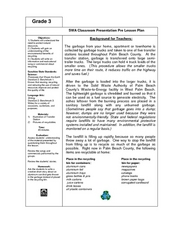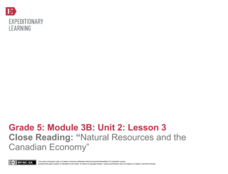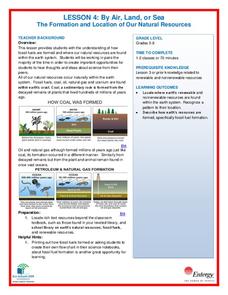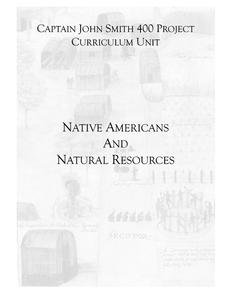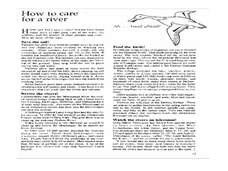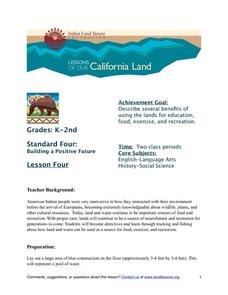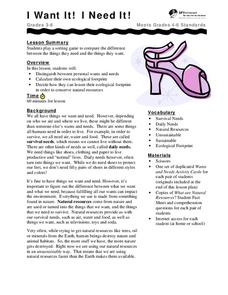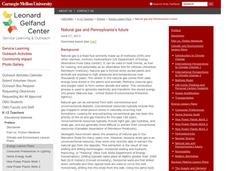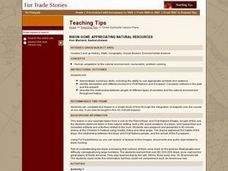Curated OER
Protecting Natural Resources
Third graders recognize what our natural resources are and their importance. In this natural resource recycling lesson, 3rd graders understand why it is important to recycle and conserve natural resources. Students can explain how...
Curated OER
Natural Resources and Ancient Cities
Students explain how the availability of natural resources has affected human settlement patterns. They recognize the interactions of human populations on environments and compare the growth of two ancient cities in relation to natural...
Curated OER
Our Natural Resources
Your class will learn about natural resources and man-made items and differentiate between them. They chart resources from seven pictures and explain how each natural resource is used.
Curated OER
The Natural State
Following an examination of the Arkansas state quarter, your class will discuss the state's nickname: "The Natural State." They will focus on its abundance of natural resources. Printables for the activities are included.
EngageNY
Close Reading: “Natural Resources and the Canadian Economy”
Readers continue to learn how natural resources are important to Canada's economy. They read, annotate, and answer text-dependent questions about Natural Resources and the Canadian Economy. They then discuss key terms in the text.
National Wildlife Federation
By Air, Land, or Sea: The Formation and Location of Our Natural Resources
Coal forms from the ancient remains of plants that were alive on Earth before the dinosaurs! Scholars use their t-charts from the previous lesson over resources and research to determine if their information is correct. Through analysis...
Curated OER
Native Americans and Natural Resources
North American Indian civilizations had already been in place for over 10,000 years before the arrival of European settlers. Introduce your young historians to Indian tribes that lived in the Chesapeake region in the early seventeenth...
EngageNY
Research Skills, Part 1: Natural Resource Development and How it Modifies the Physical Environment
Put it in your own words. Scholars complete a mini instructional activity about paraphrasing then complete a note catcher using the text A Limited Supply. They continue studying Canada's natural resources by analyzing the graph...
EngageNY
Research Skills, Part 2: Natural Resource Development and How It Modifies the Physical Environment
Name your source. Scholars receive research folders with articles of information about natural resources. They use the sources to conduct research to answer questions about how Canada's environment meets the needs of the people and how...
NASA
Natural Resources on Earth
Natural resources do not always occur so naturally. Lead classes through a thorough set of lessons investigating the natural resources important for plants. Learners complete a series of worksheets as they explore the information and...
Curated OER
The Delicate Balance - Iowa's Natural Resources
Discover the natural resources in Iowa by studying it's history. For this environmental lesson, your students will observe a topographical map of Iowa and identify where its most valuable resources are. They complete an Iowa name...
Curated OER
Natural Resources Product Booklet
Learners conduct a research activity and create a base product booklet that helps them recognize the resources that are available to them from the natural resources in the area that they live in.
American Chemical Society
Natural Resources and Synthetic Materials
All synthetic materials began as natural materials. An engaging lesson plan begins with a hands-on activity and an example of the type of research that scholars perform independently. Then pupils receive a topic and begin researching the...
California Academy of Science
Natural Resources Bingo
Bingo isn't just a silly game, it's a great way to practice all types of skills. After reviewing that the earth is composed of natural resources, what those natural resources are, and sustainability, the class plays a game of bingo. The...
Curated OER
Musical Resources
Students complete a simulation similar to musical chairs where the chairs represent natural resources and when one is taken away, the people still stay in the game. In this natural resources lesson plan, students learn about supply,...
Indian Land Tenure Foundation
Gifts from Land and Water
With a series of fun hands-on simulations, young children can learn about conservation and natural resources. Your learners become land detectives, discussing and investigating the gifts that the land and water provide them. They then...
Indian Land Tenure Foundation
Sharing Resources: The Nuts Game
The land has always provided its inhabitants with resources that allow them to survive. However, sometimes resources run scarce and sharing becomes an important task. Help little ones understand why and how people have shared resources...
Curated OER
What is an Ecological Footprint?
Introduce youngsters to the term ecological footprint. Learners identify ways in which humans affect the environment. They look at the problems associated with the use of natural resources, and focus on ways to preserve natural...
City and County of San Francisco
I Want It! I Need It!
Discuss wants and needs with your elementary ecologists and get them to consider what would happen to our natural resources if we all got everything that we want. Learners play a card sorting game and take an ecological footprint quiz on...
Curated OER
Lemonade For Sale
2-3rd graders listen to the story, Lemonade for Sale, by Stuart J. Murphy. In the story, children produce and sell lemonade to raise money for their clubhouse, create a product, classify the resources used in production as natural...
Carnegie Mellon University
Natural Gas and Pennsylvania’s Future
Beginning with a general discussion about natural gas, methane, and hydrocarbons, a few videos and diagrams are projected to support the lecture. Individuals participate in a brief activity by drinking juice through a straw, and then...
Curated OER
Wattle and Daub Using Natural Resources to Survive
Seventh graders create list of materials that family of four would need to live and survive in the forest, identify four natural resources used by Cherokee Indians to build shelter, create poster that depicts Cherokee hamlet in summer or...
Curated OER
Bison Gone: Appreciating Natural Resources
Students examine the effects of the loss of the bison after the Europeans arrived in North America. They conduct a demonstration using beans to demonstrate the difference between the number of bison before and after the arrival of the...
Howard Hughes Medical Institute
The Making of the Fittest: Natural Selection in Humans
Sickle cell disease only occurs when both parents contribute the trait, and mostly in those of African descent. Where did it come from? How did it evolve? Tony Allison, a molecular biologist, noticed a connection between sickle cell and...
Other popular searches
- Conserving Natural Resources
- Brazil Natural Resources
- Canadian Natural Resources
- New York Natural Resources
- Finite Natural Resources
- And Natural Resources
- Alberta's Natural Resources
- Natural Resources of Water
- Alaska's Natural Resources
- East Asia Natural Resources
- Conserve Natural Resources
- Natural Resources Michigan


